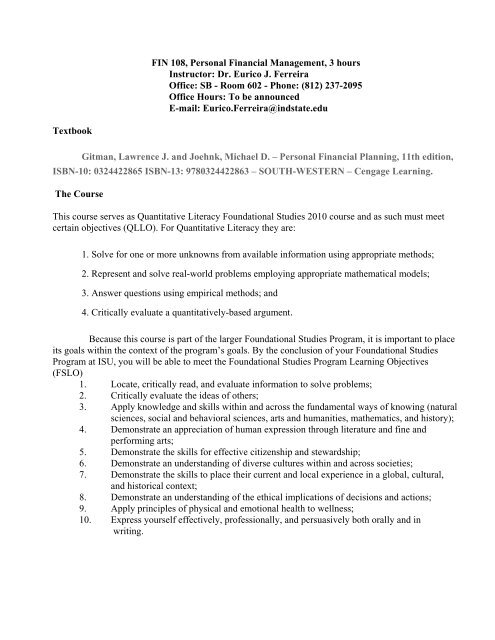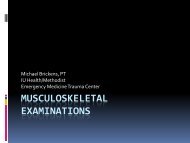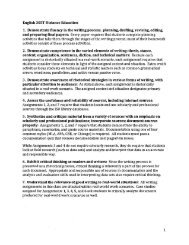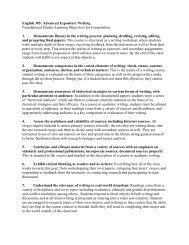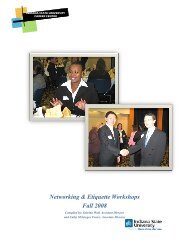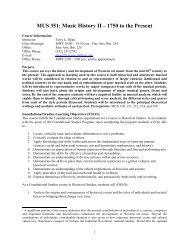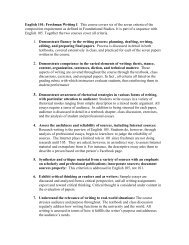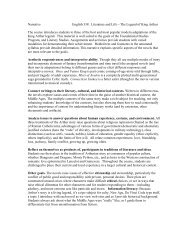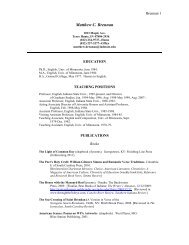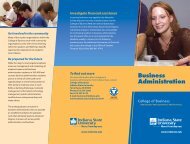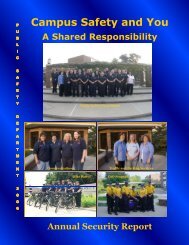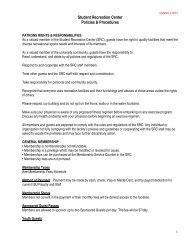You also want an ePaper? Increase the reach of your titles
YUMPU automatically turns print PDFs into web optimized ePapers that Google loves.
<strong>FIN</strong> <strong>108</strong>, Personal Financial Management, 3 hours<br />
Instructor: Dr. Eurico J. Ferreira<br />
Office: SB - Room 602 - Phone: (812) 237-2095<br />
Office Hours: To be announced<br />
E-mail: Eurico.Ferreira@indstate.edu<br />
Textbook<br />
Gitman, Lawrence J. and Joehnk, Michael D. – Personal Financial Planning, 11th edition,<br />
ISBN-10: 0324422865 ISBN-13: 9780324422863 – SOUTH-WESTERN – Cengage Learning.<br />
The Course<br />
This course serves as Quantitative Literacy Foundational Studies 2010 course and as such must meet<br />
certain objectives (QLLO). For Quantitative Literacy they are:<br />
1. Solve for one or more unknowns from available information using appropriate methods;<br />
2. Represent and solve real-world problems employing appropriate mathematical models;<br />
3. Answer questions using empirical methods; and<br />
4. Critically evaluate a quantitatively-based argument.<br />
Because this course is part of the larger Foundational Studies Program, it is important to place<br />
its goals within the context of the program’s goals. By the conclusion of your Foundational Studies<br />
Program at ISU, you will be able to meet the Foundational Studies Program Learning Objectives<br />
(FSLO)<br />
1. Locate, critically read, and evaluate information to solve problems;<br />
2. Critically evaluate the ideas of others;<br />
3. Apply knowledge and skills within and across the fundamental ways of knowing (natural<br />
sciences, social and behavioral sciences, arts and humanities, mathematics, and history);<br />
4. Demonstrate an appreciation of human expression through literature and fine and<br />
performing arts;<br />
5. Demonstrate the skills for effective citizenship and stewardship;<br />
6. Demonstrate an understanding of diverse cultures within and across societies;<br />
7. Demonstrate the skills to place their current and local experience in a global, cultural,<br />
and historical context;<br />
8. Demonstrate an understanding of the ethical implications of decisions and actions;<br />
9. Apply principles of physical and emotional health to wellness;<br />
10. Express yourself effectively, professionally, and persuasively both orally and in<br />
writing.
2<br />
The program is also designed to build skills for applied learning. These Skill and Applied Learning<br />
Objectives (S&ALO) require that the course contribute to<br />
1. Developing critical thinking skills.<br />
2. Developing information literacy skills<br />
3. Developing your writing skills (by including a graded writing component)<br />
This course will directly address all of the Quantitative Literacy Foundational Studies<br />
Objectives, all of the Skill and Applied Learning Objectives and all but two of the overall Foundational<br />
Studies Goals (4 and 9). Specifically, you will be required to<br />
1) Identify the benefits of using personal financial planning technologies to manage your<br />
personal finances ( S&ALO#1; FSLO#1 & # 5).<br />
2) Learn the financial planning process and be able to define your major financial goals<br />
(QLLO#2; S&ALO#1 and #2; FSLO#5).<br />
3) Understand that personal financial plans must change according to your life situation<br />
(QLLO#2; S&ALO#1 & #2; and FSLO #8).<br />
4) Understand how government, business, and consumer actions as well changing economic<br />
conditions affect personal financial goals (QLLO#4; S&ALO#1 & #2; and FSLO #6 & #7).<br />
5) Evaluate the impact of age, marital status, education, geographic location, and career choice<br />
on personal income (QLLO#1 & #2; S&ALO#1 & #2; and FSLO #3, #7 & #8).<br />
6) Recognize the importance of career planning and its relationship to personal financial<br />
planning (QLLO#4; S&ALO#1 & #2; and FSLO #5, #7 & #8).<br />
7) Understanding the role of financial statements, professional financial planners, and special<br />
planning concerns in the financial planning process. (QLLO#1 & #2; S&ALO#1 & #2; and<br />
FSLO #3).<br />
8) Put a monetary value on financial goals using time value of money concepts (QLLO#1 & #2;<br />
S&ALO#2; and FSLO #7).<br />
9) Prepare a personal balance sheet (QLLO#1 & #2; S&ALO#1 & #2; and FSLO #1 and #3).<br />
10) Generate a personal income and expense statement (QLLO#1 & #2; S&ALO#1 & #2; and<br />
FSLO #1 and #3).<br />
11) Learning to develop a good record-keeping system and use ratios to interpret personal<br />
financial statements. (QLLO#1 & #2; S&ALO#1 & #2; and FSLO #1 and #3).<br />
12) Construct a cash budget and use it to monitor and control spending (QLLO#1 & #2;<br />
S&ALO#1 & #2; and FSLO #1 and #3).<br />
13) Understand how to manage your taxes (QLLO#4; S&ALO#1 & #2; and FSLO #5, #7<br />
& #8).<br />
14) Understand how to manage your cash and savings. (QLLO#4; S&ALO#1 & #2; and FSLO<br />
#5, #7 & #8).<br />
15) Learn the options on making automobile and housing decisions(QLLO#2, #3 & #4;<br />
S&ALO#1 & #2; and FSLO #1, #2 & #8).<br />
16) Understand how to manage credit – Borrowing and Using Consumer Loans (QLLO#2, #3 &<br />
#4; S&ALO#1 & #2; and FSLO #1, #2 & #8).<br />
17) Learn the importance of managing your insurance needs (QLLO#2, #3 & #4; S&ALO#1 &
3<br />
#2; and FSLO #1, #2 & #8).<br />
18) Learn the importance of managing your investments. (QLLO#2, #3 & #4; S&ALO#1 &<br />
#2; and FSLO #1, #2 & #8).<br />
19) Understand the importance of planning for retirement and estate planning (QLLO#2, #3 &<br />
#4; S&ALO#1 & #2; and FSLO #1, #2 & #8).<br />
20) Learn to use a Personal Financial Planning Software (QLLO#2, #3 & #4; S&ALO#1 &<br />
#2; and FSLO #3 & #7).<br />
21) Use blank worksheets provided with the textbook for dealing with several aspects of<br />
the personal financial planning process (QLLO#2, #3 & #4; S&ALO#1 & #2; and FSLO #1<br />
& #7).<br />
22) Write essays (in the context of quizzes and exams) to describe several aspects of the<br />
personal financial planning process (S&ALO#3; and FSLO #10).<br />
23) Write answers to five selected concepts-in-review question in each chapter. You should<br />
select those questions based on your particular interest (S&ALO#3; and FSLO 10).<br />
Overall these objectives require that the course expose you to the methods and uses of six-parts<br />
of the personal financial planning: (1) foundations of financial planning; (2) managing basic assets; (3)<br />
managing credit; (4) managing insurance needs; (5) managing investments; (6) retirement and estate<br />
planning. The course organizational scheme revolves around financial decision making that is firmly<br />
established on an operational set of financial plans (FSLO #1, & #3).<br />
An important part of <strong>FIN</strong> <strong>108</strong>, Personal Financial Management, is to alert you to erroneous<br />
assumptions of value and beliefs that personal financing plans are not necessary or, if they exist, are<br />
static. This course emphasizes the dynamics of the personal financial planning process by considering<br />
the impact of life changes – birth, marriage, divorce, job and career, and death ( QLLO#2, #3 & #4;<br />
S&ALO#1 & #2; and FSLO #1 & #7).<br />
Personal financial management is also something that everyone deals with or is exposed to<br />
almost every day of their lives. <strong>FIN</strong> <strong>108</strong> will provide you with the tools to question, evaluate, and plan<br />
your own financial needs for the years to come both during the course and once the course has ended.<br />
You can become a more responsible citizen when you learn how to manage your assets and liabilities<br />
(FSLO #5). You can also be better prepared for changes and emergencies during your life cycle (FSLO<br />
#7).<br />
Grading Policy<br />
Attendance to the lectures is important for a good understanding of this course material and,<br />
therefore, may affect your final grade. Although, attendance will be randomly verified,<br />
attendance & class participation will be 5% of the student final grade. Students who miss<br />
three or more classes will not receive points for attendance and class participation.<br />
The remaining 95% of your grade will come from (1) Three Written Essays (10%) and (2)<br />
Quizzes (85%). At this time, it is best that you use Firefox 4 or Internet Explorer 6 or 7 to take<br />
any quiz, otherwise you may be disconnect from your attempt and, hence, preventing you from<br />
completion. Students may take up to fifteen quizzes on the scheduled dates. At the semester end,<br />
the instructor will average your higher twelve-quiz grades to compute your quizzes final grade.
4<br />
Quizzes date are indicated below on the Course Tentative Sequence Plan.<br />
Scale:<br />
A (from 90 to higher final grade average);<br />
A- (from 89 to 88 final grade average);<br />
B+ (from 87 to 86 final grade average);<br />
B (from 85 to 80 final grade average);<br />
B - (from 79 to 78 final grade average);<br />
C+ (from 77 to 76 final grade average);<br />
C (from 75 to 70 final grade average);<br />
C - (from 69 to 68 final grade average);<br />
D+ (from 67 to 66 final grade average);<br />
D (from 65 to 60 final grade average);<br />
D- (from 59 to 57 final grade average).<br />
"The Sycamore Standard"<br />
<strong>Indiana</strong> <strong>State</strong> <strong>University</strong><br />
Students at <strong>Indiana</strong> <strong>State</strong> <strong>University</strong> are expected to accept certain personal responsibilities that<br />
constitute the "standard" for behavior in a community of scholars.<br />
As a student at <strong>Indiana</strong> <strong>State</strong> <strong>University</strong>:<br />
I will practice personal and academic integrity; I will commit my energies to the pursuit of truth,<br />
learning, and scholarship; I will foster an environment conducive to the personal and academic<br />
accomplishment of all students; I will avoid activities that promote bigotry or intolerance; I will<br />
choose associations and define my relationships with others based on respect for individual rights<br />
and human dignity; I will conduct my life as a student in a manner that brings honor to me and to the<br />
<strong>University</strong> Community; I will discourage actions or behaviors by others that are contrary to these<br />
standards.<br />
Adopted by the <strong>Indiana</strong> <strong>State</strong> <strong>University</strong> Student Government Association April 17, 2002<br />
AMERICAN WITH DISABILITES ACT STATEMENT<br />
“<strong>Indiana</strong> <strong>State</strong> <strong>University</strong> seeks to provide effective services and accommodation for qualified<br />
individuals with documented disabilities. If you need an accommodation because of a documented<br />
disability, you are required to register with Disability Support Services at the beginning of the semester.<br />
Contact the Director of Student Support Services. The telephone number is 237-2301 and the office is<br />
located in Gillum Hall, Room 202A. The Director will ensure that you receive all the additional help<br />
that <strong>Indiana</strong> <strong>State</strong> offers.<br />
If you will require assistance during an emergency evacuation, notify your instructor immediately.<br />
Look for evacuation procedures posted in your classrooms.”<br />
Laptop Usage<br />
Your use of a laptop is generally permitted as long as such usage remains within the bounds of the Code
5<br />
of Student Conduct and it conforms to the provisions of its use as laid out in this syllabus. There may be<br />
occasions where laptop usage is forbidden and if that occurs, failure to comply with this direction will<br />
be viewed as a violation of the Code of Student Conduct.<br />
Academic Freedom<br />
Teachers are entitled to freedom in the classroom in discussing their subject, but they should be careful not to<br />
introduce into their teaching controversial matter which has no relation to their subject.<br />
The preceding comes from the American Association of <strong>University</strong> Professors statement on academic<br />
freedom. Though the entire statement1 speaks to many issues, it is this portion on the conduct of the course that is most relevant. For the<br />
purpose of Foundational Studies courses this means that faculty have the right to conduct their class in a fashion they deem appropriate as long as the<br />
material presented meets the learning objectives laid out by the entire faculty.<br />
1 http://www.aaup.org/AAUP/pubsres/policydocs/contents/1940statement.htm
6<br />
Fall 2010 <strong>FIN</strong> <strong>108</strong> Personal Financial Management Course Sequence<br />
For Twice‐Week Class Meetings<br />
Date Chapter Assignment<br />
Wednesday, August 25, 2010 Ch1 ‐ Underst. Fin. Plan. Process<br />
Monday, August 30, 2010 Ch1 ‐ Underst. Fin. Plan. Process<br />
Wednesday, September 01, 2010 Ch2 ‐ Your Fin. <strong>State</strong>ments & Plans<br />
Friday, September 03, 2010 Quiz Chapter 1<br />
Saturday, September 04, 2010 Quiz Chapter 1<br />
Sunday, September 05, 2010 Quiz Chapter 1<br />
Monday, September 06, 2010<br />
Labor Day<br />
Wednesday, September 08, 2010 Ch2 ‐ Your Fin. <strong>State</strong>ments & Plans<br />
Friday, September 10, 2010 Quiz Chapter 2<br />
Saturday, September 11, 2010 Quiz Chapter 2<br />
Sunday, September 12, 2010 Quiz Chapter 2<br />
Monday, September 13, 2010 Ch3 ‐ Managing Your Taxes<br />
Wednesday, September 15, 2010 Ch3 ‐ Managing Your Taxes Written Essay#1<br />
Friday, September 17, 2010 Quiz Chapter 3<br />
Saturday, September 18, 2010 Quiz Chapter 3<br />
Sunday, September 19, 2010 Quiz Chapter 3<br />
Monday, September 20, 2010 Ch4 ‐ Manag. Cash & Savings<br />
Wednesday, September 22, 2010 Ch4 ‐ Manag. Cash & Savings<br />
Friday, September 24, 2010 Quiz Chapter 4<br />
Saturday, September 25, 2010 Quiz Chapter 4<br />
Sunday, September 26, 2010 Quiz Chapter 4<br />
Monday, September 27, 2010 Ch5 ‐ Making Auto & Housing Dec.<br />
Wednesday, September 29, 2010 Ch5 ‐ Making Auto & Housing Dec.<br />
Friday, October 01, 2010 Quiz Chapter 5<br />
Saturday, October 02, 2010 Quiz Chapter 5<br />
Sunday, October 03, 2010 Quiz Chapter 5<br />
Monday, October 04, 2010 Ch 6 ‐ Borrowing on Open Account<br />
Wednesday, October 06, 2010 Ch 6 ‐ Borrowing on Open Account<br />
Thursday, October 07, 2010 Quiz Chapter 6<br />
Friday, October 08, 2010<br />
Fall Break<br />
Saturday, October 09, 2010<br />
Fall Break<br />
Sunday, October 10, 2010<br />
Fall Break<br />
Monday, October 11, 2010 Ch 7‐ Using Consumer Loans<br />
Tuesday, October 12, 2010 Quiz Chapter 6<br />
Wednesday, October 13, 2010 Ch 7‐ Using Consumer Loans Written Essay#2<br />
Friday, October 15, 2010 Quiz Chapter 7<br />
Saturday, October 16, 2010 Quiz Chapter 7<br />
Sunday, October 17, 2010 Quiz Chapter 7<br />
Monday, October 18, 2010<br />
Ch 8‐ Insuring Your Life<br />
Wednesday, October 20, 2010 Ch 9 ‐ Insuring Your Health<br />
Friday, October 22, 2010 Quiz Chapter 8<br />
Saturday, October 23, 2010 Quiz Chapter 8<br />
Sunday, October 24, 2010 Quiz Chapter 8
7<br />
Monday, October 25, 2010<br />
Ch 9 ‐ Insuring Your Health<br />
Wednesday, October 27, 2010 Ch 10‐ Protecting Your Property<br />
Friday, October 29, 2010 Quiz Chapter 9<br />
Saturday, October 30, 2010 Quiz Chapter 9 ‐10<br />
Sunday, October 31, 2010 Quiz Chapter 9 ‐10<br />
Monday, November 01, 2010 Ch 11‐ Investment Planning<br />
Wednesday, November 03, 2010 Ch 11‐ Investment Planning<br />
Friday, November 05, 2010 Quiz Chapter 11<br />
Saturday, November 06, 2010 Quiz Chapter 11<br />
Sunday, November 07, 2010 Quiz Chapter 11<br />
Monday, November 08, 2010 Ch12 ‐ Investing In Stocks & Bonds<br />
Wednesday, November 10, 2010 Ch12 ‐ Investing In Stocks & Bonds<br />
Friday, November 12, 2010 Quiz Chapter 12 Written essay#3<br />
Saturday, November 13, 2010 Quiz Chapter 13<br />
Sunday, November 14, 2010 Quiz Chapter 14<br />
Monday, November 15, 2010 Ch 13‐ Investing in Mutual Funds<br />
Wednesday, November 17, 2010 Ch 13‐ Investing in Mutual Funds<br />
Friday, November 19, 2010 Quiz Chapter 13<br />
Saturday, November 20, 2010 Quiz Chapter 13<br />
Sunday, November 21, 2010 Quiz Chapter 13<br />
Monday, November 22, 2010 Ch 14 ‐ Planning for Retirement<br />
Wednesday, November 24, 2010<br />
Thanksgiving<br />
Thursday, November 25, 2010<br />
Thanksgiving<br />
Friday, November 26, 2010<br />
Thanksgiving<br />
Saturday, November 27, 2010<br />
Thanksgiving<br />
Sunday, November 28, 2010<br />
Thanksgiving<br />
Monday, November 29, 2010 Ch 14 ‐ Planning for Retirement<br />
Wednesday, December 01, 2010 Ch 15 ‐Preserving the Estate<br />
Friday, December 03, 2010 Quiz Chapter 14<br />
Saturday, December 04, 2010 Quiz Chapter 14<br />
Sunday, December 05, 2010 Quiz Chapter 14<br />
Monday, December 06, 2010 Ch 15 ‐Preserving the Estate Study Week<br />
Tuesday, December 07, 2010 Content to be determined Study Week<br />
Wednesday, December 08, 2010 Content to be determined Study Week<br />
Thursday, December 09, 2010 Content to be determined Study Week<br />
Friday, December 10, 2010 Content to be determined Study Week<br />
Monday, December 13, 2010 Quiz Chapter 15* Final Exams<br />
Tuesday, December 14, 2010 See NOTE below Final Exams<br />
Wednesday, December 15, 2010<br />
Final Exams<br />
Thursday, December 16, 2010<br />
Final Exams<br />
Friday, December 17, 2010<br />
Final Exams<br />
NOTE: Quiz on Chapter 15 to be taken on the course final exam day
8<br />
<strong>FIN</strong> <strong>108</strong> Course Narrative<br />
for Foundational Studies Quantitative Literacy Credit<br />
Personal Financial Management<br />
Personal Financial Planning is applied Economics with respect to all of the major personal<br />
financial problems that individuals and families encounter. This course is built around a model that links<br />
together all of the major elements of effective money management. All of the latest financial planning<br />
tools and techniques are discussed. The roles of various financial decisions in the overall personal<br />
financial planning process are clearly delineated.<br />
In every class period, the actions of an individual & family are shown to impact on personal<br />
financial planning. An important methodological resource will be the set of worksheets which<br />
accompanies the textbook. It will support the development of critical thinking, and demonstrate the use<br />
of financial models and statements which are important for personal financial planning. Summary of<br />
personal financial goals, analyzing the benefit of a second income, balance sheet and income and<br />
expense statements, computation of tax returns, comparing lease versus automobile purchases costs,<br />
home affordability analysis, rent-or-buy cost comparison, mortgage refinancing analysis, tracking<br />
consumer debt, to borrow or not to borrow, determining the need for life insurance, finding the amount<br />
of investment capital, estimating future retirement needs, annual cash budget by month, budget control<br />
schedule, and keeping tabs on the personal investment holdings are all issues to be examined in the<br />
course with support of that methodological resource.<br />
Students are required to critically compare competing personal finance goals. Differences of<br />
cases are explained so that students can use their experiences and insights to judge for themselves the<br />
efficacy of various models. Through assignments students are required to explore the data that exists on<br />
a number of different situations and through assessments they are required to analyze (typically through<br />
the use of finance models) these situations. Students are also required to give a written analysis on<br />
selected topics of importance.
9<br />
Annotated Schedule<br />
Fall 2010 <strong>FIN</strong> <strong>108</strong> Personal Financial Management Course Tentative Sequence Plan<br />
For Twice‐Week Class Meetings ( Monday & Wednesday)<br />
Date<br />
Topic<br />
Wednesday, August 25, 2010<br />
Ch1 ‐ Understanding the Financial Planning Process<br />
Rewards of sound financial planning, The personal financial planning process,<br />
Fom goals to plans‐a lifetime of planning, The planing environment,<br />
Your personal income determinants, using Personal Financial Planners<br />
Worsheet: Summary of Personal Financial Goals<br />
Wednesday, September 01, 2010<br />
Ch2 ‐ Your Fin. <strong>State</strong>ments & Plans<br />
Mapping out your Financial Future, The time value of money, Preparing a<br />
statement of your financial condition, Measuring your income and expense,<br />
Preparing your personal financial statements, Setting up a cash budget<br />
Worksheets: (1) Analysing the benefit of a second income; (2) Balance sheet;<br />
(3) Income and expense statement; and (4) Annual cash budget by month<br />
Learning<br />
Objectives<br />
FSLO 1, 5 & 8<br />
QLLO 1 & 2<br />
S&ALO 1<br />
FSLO 1, 3 & 7<br />
QLLO 1, 2 & 3<br />
S&ALO 1, 2, 3, & 4<br />
Monday, September 13, 2010<br />
Monday, September 20, 2010<br />
Monday, September 27, 2010<br />
Monday, October 04, 2010<br />
Monday, October 11, 2010<br />
Monday, October 18, 2010<br />
Wednesday, October 20, 2010<br />
Wednesday, October 27, 2010<br />
Ch3 ‐ Managing Your Taxes<br />
Principles of federal income taxes, Why taxable income matters, Calculating<br />
and filling your taxes, Effect tax planning, other forms of personal taxes<br />
Worksheets: (1) 2010 Tax return form (form 1040EZ); and (2) 2010 form 1040<br />
September 15 Written Essay # 1 is due: Comment on the US tax system fairness<br />
Ch4 ‐ Management of Cash & Savings<br />
The role of cash management in personal financial planning, Today's financial<br />
services marketplace, Various cash management products, Establishing<br />
a savings program, Keeping a checking account<br />
Worsheet: An account reconciliation form statement<br />
Ch5 ‐ Making Auto & Housing Dec.<br />
Buying or leasing an automobile, Meeting housing needs, How much housing<br />
can you afford, The rental option, The home‐buying process, Financing the transaction<br />
Worksheets: (1) comparing automobile lease to buy; (2) home affordability<br />
analysis; and (3) rent‐or buy house cost comparison; (4) Mortage ref. analysis<br />
Ch 6 ‐ Borrowing on Open Account<br />
Basic concepts of credit, Types of open account credit, Obtaining and managing<br />
open account credit, Using credit wisely.<br />
Ch 7‐ Using Consumer Loans<br />
Basic features of consumer loans, Managing your credit, single‐payment<br />
loans, Installement loans, student loans<br />
Worsheets (1) Tracking your consumer debt; and (2) To borrow or not to borrow<br />
October 13 Written Essay # 2 is due: What are the implications of personal<br />
bankruptcy filings?<br />
Ch 8‐ Insuring Your Life<br />
Basic insurance concepts, How much life insurance is right for you, What kind<br />
of policy is right for you; Key features of life insurance policy<br />
Worsheet: Determining the need for life insurance<br />
Ch 9 ‐ Insuring Your Health<br />
The need for health care insurance coverage, Types and sources of health<br />
care plans, Medical expense coverage and policy provisions, Long‐term care<br />
insurance, Disability income insurance, Buying health care insurance<br />
Worksheets: (1) Estimating disability income insurance needs; (2) Health<br />
care plan checklist<br />
Ch 10‐ Protecting Your Property<br />
Basic principles of property insurance, Homeowner's insurance, auto insurance,<br />
Other property and liability insurance, Buying insurance and settling claims<br />
FSLO 1 , 2, 5, & 10<br />
QLLO 2, 3 & 4<br />
S&ALO 1, 2, & 3<br />
FSLO 1, 2, 3, 5, & 7<br />
QLLO 2, 3 & 4<br />
S&ALO 1, 2 & 3<br />
FSLO 1, 2, 3, 5, 7, & 8<br />
QLLO 1, 2, 3 & 4<br />
S&ALO 1, 2 & 3<br />
FSLO 1, 2, 3, 5, 7, & 8<br />
QLLO 1, 2, 3 & 4<br />
S&ALO 1, 2 & 3<br />
FSLO 1, 2, 3, 5, 7, 8,<br />
& 10<br />
QLLO 1, 2, 3 & 4<br />
S&ALO 1, 2 & 3<br />
FSLO 1, 2, 3, & 5<br />
QLLO 1, 2, 3 & 4<br />
S&ALO 1, 2 & 3<br />
FSLO 1 & 5<br />
QLLO 1 & 2<br />
S&ALO 1<br />
FSLO 1 & 5<br />
QLLO 1 & 2<br />
S&ALO 1, 2, & 3
10<br />
Monday, November 01, 2010<br />
Monday, November 08, 2010<br />
Monday, November 15, 2010<br />
Monday, November 22, 2010<br />
Wednesday, December 01, 2010<br />
Annotated Schedule ‐ Continued<br />
Ch 11‐ Investment Planning<br />
Objectives and rewards of investing, Securities market, Making transactions in<br />
the securities market, Becoming an informed trader, Online investing, Managing<br />
your investment holdings<br />
Worksheets: (1) Finding the amount of investment capital, (2) Keeping tabs on your<br />
investment holdings<br />
Ch12 ‐ Investing In Stocks & Bonds<br />
Risks and rewards of investing, Investing in common stocks, Investing in bonds,<br />
Preferred and convertibles<br />
November 11 Written Essay # 3 is due: Explain what TIPS are and discuss their<br />
advantages and disadvantages?<br />
Ch 13‐ Investing in Mutual Funds<br />
Mutual funds basics, Types of mutual funds and fund services, Making mutual funds<br />
investments<br />
Ch 14 ‐ Planning for Retirement<br />
Overview of retirement planning, Social security, Pension palns and retirement<br />
programs, annuities<br />
Worksheet: (1) Estimating future retirement needs<br />
Ch 15 ‐Preserving the Estate<br />
Principles of estate planning, Wills, Trusts, Gift taxes, Estate taxes and planning<br />
Worksheets: (1) Checklist of items to keep in a safe‐deposit box; (2) Computing<br />
Federal Estate Tax due<br />
FSLO 1 & 5<br />
QLLO 1 & 2<br />
S&ALO 1 & 3<br />
FSLO 1, 5, & 10<br />
QLLO 1 & 2<br />
S&ALO 1 &3<br />
FSLO 1 & 5<br />
QLLO 1 & 2<br />
S&ALO 1<br />
FSLO 1 & 5<br />
QLLO 1 & 2<br />
S&ALO 1<br />
FSLO 1 & 5<br />
QLLO 1 & 2<br />
S&ALO 1


